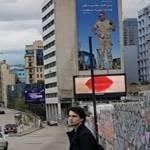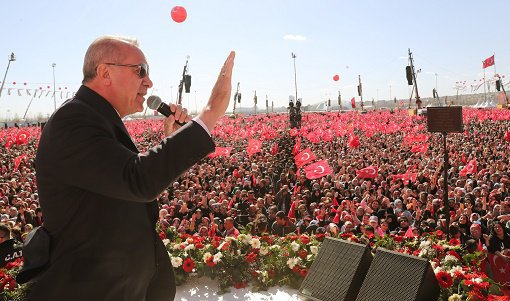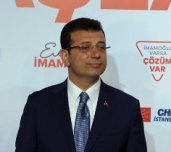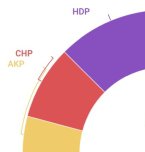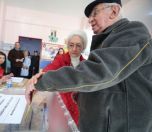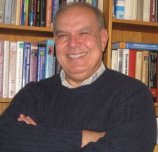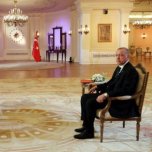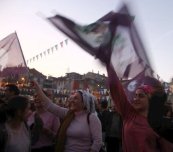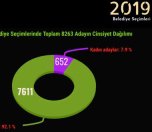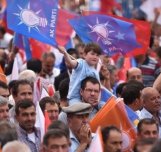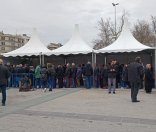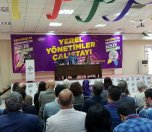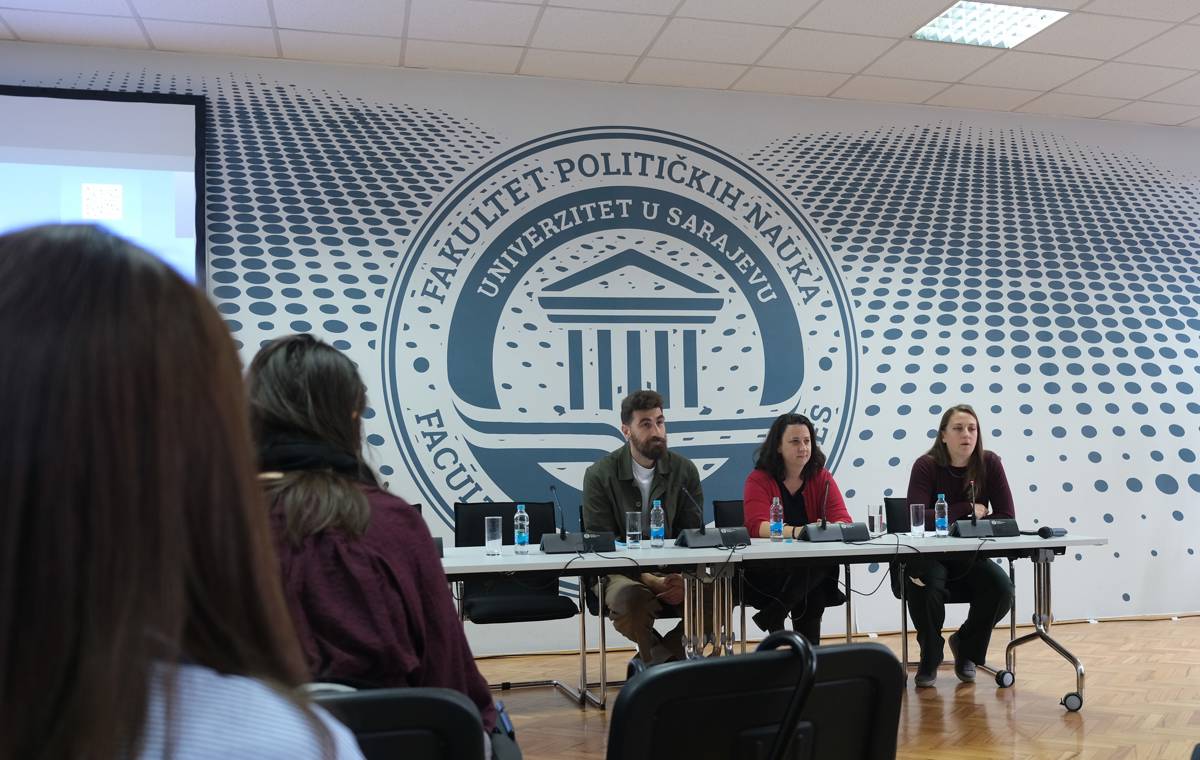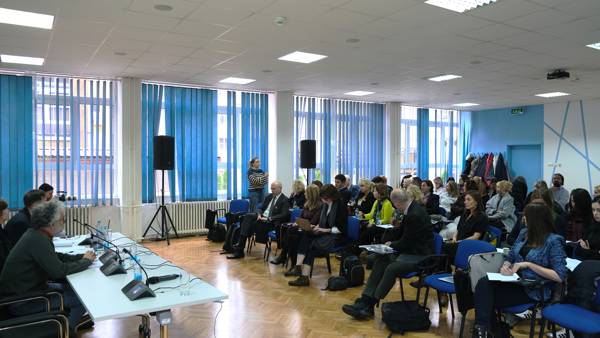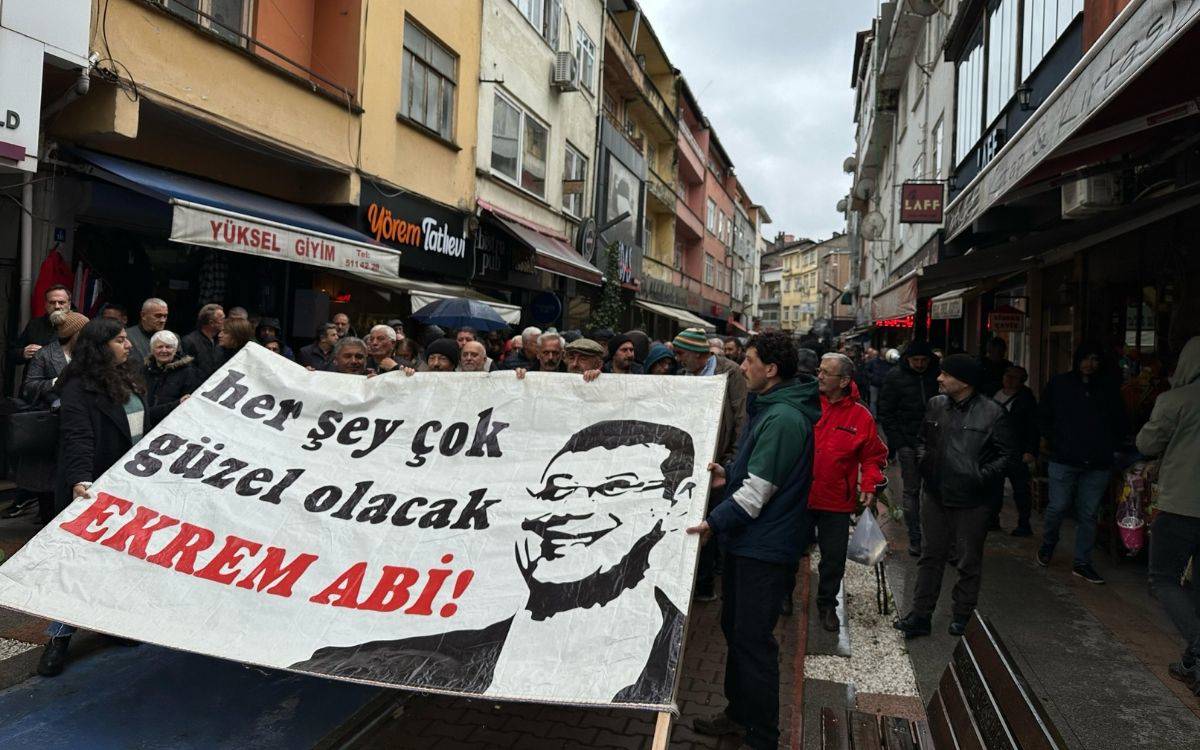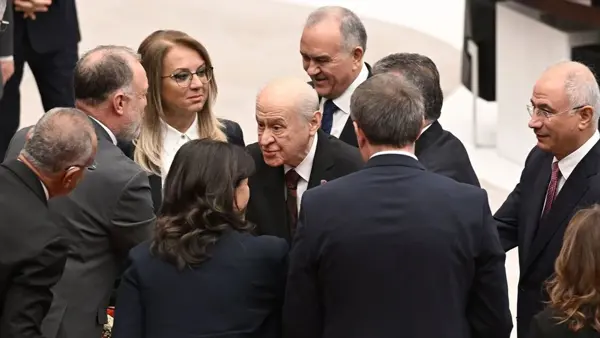*President Erdoğan addresses his supporters at a rally in İstanbul on March 24. (Photo: AA)
Being no stranger to tense election debates dominating its politics, Turkey will go to polls on March 31 for the sixth time in the last five years, to elect more than 20 thousand local administrators.
Although this is a municipal poll, the atmosphere is no different than in a general election, as the ruling AKP and its ally MHP excessively use the rhetoric of "the election of the survival of the state and the nation."
Here is everything you need to know about Turkey's last polls until the 2023 presidential and parliamentary elections.
How do the local elections work?
People of Turkey go to the polls to elect their local administrators once in every five years.
People will vote for 30 metropolitan, 51 city, 919 district, and 397 town municipalities.
There is a unitary state system in Turkey, with 81 provinces being subordinate to the central government in Ankara.
Among those 81 provinces, 30 are called "metropolitan municipalities," and the other 51 are called city municipalities. The provinces which have at least three district municipalities or at least two town municipalities and have a minimum population of 750 thousand are designated as metropolitan municipalities.
The districts are the next biggest administrative zone after the cities. Towns are the smallest administrative zones to have a municipality.
A total of 20,498 municipal council members will be elected.
Polls will be open between 9am and 5pm in the western regions and between 8am and 4pm in the eastern regions.
The candidate who gets most votes will be elected as the mayor of that area. Members of the municipal councils will be elected upon their parties' voting rates.
One voter will cast four votes; for the city or the metropolitan municipality, for the district or town municipality, for the municipal council, and for the mukhtar (head of a village or a neighborhood).
Mukhtars of more than 50 thousand neighborhoods and villages will also be elected on March 31.
According to the Article 79 of the Constitution of Turkey, elections shall be held under the general administration and supervision of the judicial organs. An 2007 amendment to the article holds the Supreme Election Council (YSK) responsible for the elections.
Who will vote?
According to the figures of the Supreme Electoral Council (YSK), there are 57,058,636 registered voters in Turkey.
28,929,732 of them are women, and 28,128,904 are men.
1,002,293 people, or 1.75 percent of the voters, who have turned 18 since June 2018, will vote for the first time.
44,212,704 people, or 77.4 percent of the voters reside in 30 metropolitan municipalities.
57 million people will cast their votes in 51,851 polls.
Who is up for the election?
Two alliances and a total of 12 parties will participate in the elections. In 51 provinces out of 81, the ruling AKP and its ally MHP will participate in the elections as the "People's Alliance," in the other 30 cities, the two parties will compete against each other.
The People's Alliance was formed between the ruling Justice and Development Party (AKP), Nationalist Movement Party (MHP) and the Great Union Party (BBP) before the June 2018 presidential and parliamentary elections. It got 53.66 percent of the parliamentary votes.
Main opposition Republican People's Party (CHP) and its ally İYİ (Good) Party will also continue the "Nation's Alliance" they formed before the 2018 elections. The two parties will compete for 49 city municipalities as an alliance, compete against each other in 32 cities.
Results of the 2014 local elections
The Felicity Party (SP), which was a part of the Nation's Alliance in 2018 elections, will be supported by CHP, İYİ Party and Peoples' Democratic Party (HDP) in some voting areas where it is thought to be strong.
The HDP will focus on the municipalities in the south east of the country that it would hold once but currently administered by the government-appointed trustees. The party did not nominate candidates for seven metropolitan municipalities, including İstanbul, Ankara and İzmir.
By the way, as there is no legislation on alliances in local elections, these will be de facto affiliations, with one party not nominating a candidate and declaring support for its ally's candidate.
The other parties to participate in the elections are: Independent Turkey Party (BTP), Communist Party of Turkey (TKP), Patriotic Party (VP), Free Cause Party (HÜDAPAR), Democratic Party (DP), Democratic Left Party (DSP).
What is the gender distribution among the candidates?
With a 17 percent women presence in its 600-seat parliament, Turkey ranks 120th in 193 countries, according to the figures of the Inter-Parliamentary Union.
The picture is not much different in the local elections. Among 8,263 mayoral candidates, only 652, or 7.9 percent of them are women, as stated in the report of the Women's Coalition, which compiled data from the YSK and the parties.
For the 30 metropolitan municipalities, 282 men and 24 women have been nominated.
For the 919 district municipalities, the number of the male candidates is 5317, while there are only 503 female candidates.
For the 397 town municipalities, there are 1592 male candidates and 77 female candidates.
The three provinces with most female mayor candidates are İzmir (39), İstanbul (38), Ankara (22), Antalya (21), and Diyarbakır (20).
What do the parties say?
AKP & MHP: 'The election of survival of the state and the nation'
The central theme of the campaign of the People's Alliance was "the survival of the state and the nation."
Erdoğan and his ally Devlet Bahçeli, the leader of the MHP, repeatedly claimed that "the survival" is totally dependent on the outcome of the March 31 elections.
While most agree that Erdoğan tries to consolidate his supporters with such strategy, it remains to be seen if his base will buy the discourse that equals the municipal elections with the survival of the state.
Yet Erdoğan managed to determine what is to be talked, to some extent, as some topics he raised has been debated more than the candidates' promises.
- Women's Day: 'They whistled the call to prayer'
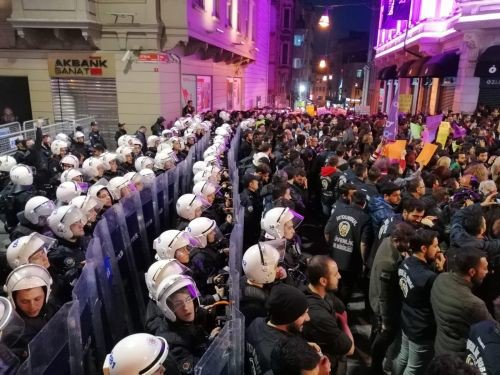 The police first let the women gather in Taksim, then attacked them on March 8.
The police first let the women gather in Taksim, then attacked them on March 8.
On March 8 International Women's Day, women gathered on Taksim square to conduct the 17th Feminist Night March. Contrary to first 16 marches, they were attacked by the police.
Erdoğan claimed in a rally on March 10 that the women whistled in protest of the azan (Muslim call to prayer).
"The other day, a group of women, who came together in Taksim for the so-called women's day under the leadership of the Republican People's Party (CHP) and Peoples' Democratic Party (HDP), behaved rudely towards the call the prayer by blowing whistles and chanting slogans.
"The ones who do not lay claim to the call to prayer would not lay claim to the country, either. They applaud the enemies when they pound at our door."
The Initiative for the 17th Feminist Night March, the organizers of the event, refuted Erdoğan's claims, saying that women protested the police violence, not the azan.
While seven pro-government newspapers put Erdoğan's claims on their headlines, they did not cover the women's statement.
After Erdoğan's claims, pro-government groups held an "azan march" in Taksim, not being intervened by the police.
- New Zealand attack: 'They will return in coffins like their grandfathers'
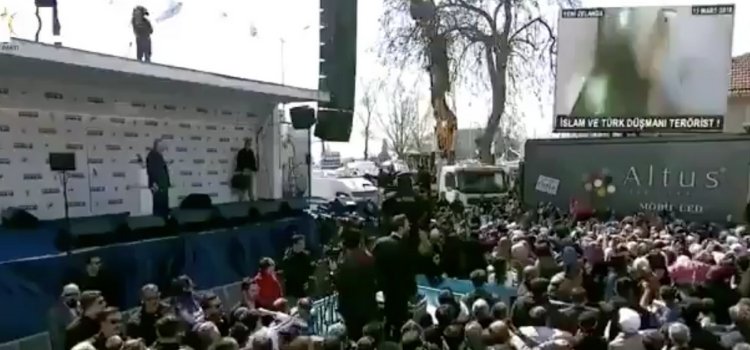 Erdoğan shows the footage of the New Zealand mosque attack at a rally on March 16 in Tekirdağ. A subtitle on the video reads, "The terrorist who is enemy of Islam and the Turks."
Erdoğan shows the footage of the New Zealand mosque attack at a rally on March 16 in Tekirdağ. A subtitle on the video reads, "The terrorist who is enemy of Islam and the Turks."
The New Zealand mosque attack on March 15 that claimed 50 lives has also been also among the subjects Erdoğan treated in his rallies.
Showing the graphic footage of the massacre in numerous rallies, Erdoğan addressed the attacker, saying that "they will return in coffins like their grandfathers if they come," referring to the Battle of Gallipoli in the World War I.
The attacker released a manifesto, saying, "We are coming for Constantinople and we will destroy every mosque and every minaret in the city. The Hagia Sophia will be liberated from the minarets, and Constantinople will be rightfully Christian owned once more."
- 'I gave order to the TV channels'
Erdoğan held a rally at the opening of a theme park in the capital Ankara on March 20. He said the main opposition CHP's chair Kemal Kılıçdaroğlu claimed that there are no dams in Antakya province.
"I gave order to the TV channels, said, 'Broadcast our dams in Reyhanlı,' so he can see the dams. He lies in the morning, he lies at night. We are fed up from winning compensations [in lawsuits] because of his lies," he told his supporters.
- 'CHP, İYİ, SP are together with PKK'
Erdoğan and other high-ranking AKP figures, along with the pro-government media, repeatedly claimed that their rivals are cooperating with the outlawed Kurdistan Workers' Party (PKK).
In a group meeting of his party in February, Erdoğan said, "These are doomsday signs. CHP, İYİ Party and Saadet are working together with PKK and its extension HDP."
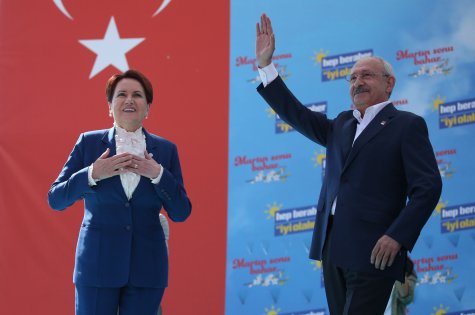 İYİ Party chair Meral Akşener and CHP chair Kemal Kılıçdaroğlu in a joint rally in Balıkesir.
İYİ Party chair Meral Akşener and CHP chair Kemal Kılıçdaroğlu in a joint rally in Balıkesir.
AKP Co-Chair Mahir Ünal claimed the PKK militants say in their radio talks that an alliance should be formed with CHP, İYİ and SP.
Minister of Interior Süleyman Soylu claimed on March 18 that the three parties have a total of 325 PKK-related candidates.
CHP & IYI: 'We are heading to elections, not war'
Rather than quarreling with Erdoğan in rallies, CHP Chair Kemal Kılıçdaroğu and his ally İYİ Party Chair Meral Akşener conduct a relatively low-profile campaign.
Addressing their supporters together in several rallies, the two mostly gave moderate messages.
In the rally in Balıkesir province on March 17, Akşener said, "We are heading to local elections, but it is as if we are heading to a war. Why did the local elections became a was scene in the words of Mr. Erdoğan? He has managed to get votes for 17 years by making us fight each other."
Kılıçdaroğlu said, "There 7.5 million unemployed in Turkey. Jobs must be found for them ... but everyday there are fights, defamations, a lot of words. It's enough! Just stay silent for three days, can you!"
 CHP's Ankara candidate Mansur Yavaş at a "hologram rally" at Kuğulu Park, Ankara on March 23.
CHP's Ankara candidate Mansur Yavaş at a "hologram rally" at Kuğulu Park, Ankara on March 23.
HDP: 'Take our municipalities back, make AKP lose'
The HDP took a different strategy than in 2014, when it participated in the election in western regions, while leaving the south east to its ally Democratic Regions Party (DBP).
For this election, the HDP will compete both in southeastern and other parts of the country, but did not nominate candidates for the seven metropolitan municipalities including İstanbul and Ankara. This decision is thought to benefit the CHP at the polls.
HDP Co-Chair Sezai Temelli summarized their strategy as "Winning in Kurdistan, making AKP and MHP lose in the west."
"Every vote to make the AKP-MHP alliance lose ground is a vote for peace," he said.
Because he used the word "Kurdistan," he was targeted by Erdoğan. In multiple rallies, Erdoğan said, "There is not a place called Kurdistan in Turkey. There is Kurdistan in northern Iraq. Get the hell out of here and go there."
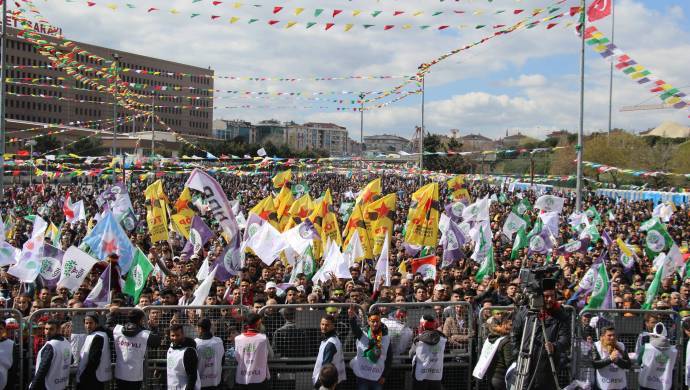
Is winning enough for HDP?
The Democratic Regions Party (DBP), an HDP ally in the southeastern regions, won 102 municipalities in the 2014 local elections. After three other mayors changed sides and became members of the DBP, the party had 105 city, district and town municipalities.
However, after the conflict period in the region in 2015 and 2016, the party lost almost all of its municipalities. Taking advantage of the state of emergency declared in the wake of the July 2016 coup attempt, the government began to appoint trustees to the DBP municipalities in the region.
Between September 11, 2016 and August 30, 2018, the Ministry of Interior appointed dismissed 94 mayors on the ground of using the municipality's resources to aid the outlawed PKK.
During this period, 93 mayors and 85 municipal council members were arrested, with 68 mayors still being behind the bars.
Thus the HDP aims to regain those municipalities in the March 31 elections. Nevertheless, it is doubtful that winning the municipalities will be enough as President Erdoğan said in as early as October 2018 that they will appoint trustees again "if those mess with terrorism are elected again." He then repeated this threat numerous times during the election campaign.
Are there 'imaginary voters'?
As soon as the voter lists were made public by the YSK in January, the imaginary voter claims emerged.
The CHP announced that they determined more than 500 imaginary voters in the Princes' Islands district in İstanbul. The party claimed that there were voters registered in abandoned buildings, house gardens or homes they don't live in. In 2014 elections, the difference in votes of the winning CHP and AKP were less than a thousand.
In the following days, similar claims were made regarding the other provinces in the country.
The Mezopotamya news agency stated in its report that the registrations of 3,187 voters from 23 provinces were moved to Halfeti district in Urfa province. In the 2014 elections, HDP edged AKP by around 3 thousand votes.
The Cumhuriyet newspaper reported that there were 40 voters registered in an AKP member's home in İstanbul.
.jpg) Some abandoned places where there are registered voters in the Princes' Islands, İstanbul. (Photo: CHP)
Some abandoned places where there are registered voters in the Princes' Islands, İstanbul. (Photo: CHP)
The YSK Chair Sadi Güven, in response to claims, said, "Just as there are no duplicate voters, there are no fake and imaginary voters."
Güven said that registrations of 91 thousand voters who do not reside in the place they were registered in were suspended after examinations.
However, the critics point out that the fact that the Ministry of Interior determining the voters casts doubt on the voter registrations.
How is the media doing?
Here are some examples from the media coverage of the election period:
TV channels refused to run HDP's advert
Public and private television channels refused to run the HDP's election advert.
Prepared to be aired on TV, the video starts with the question, "What did these hands see?" and continues, "We have suffered agony, we have paid prices, but we have never given up." The video ends with the slogan, "Raise your hands for democracy."
The party then launched a campaign on social media, calling its supporters to share the advertising video "from hand to hand."
Media conglomerate distorted HDP Co-Chair's statement
Sezai Temelli said in a TV program that if the CHP's candidates for İstanbul and Ankara are elected, "they will know that they will be elected with HDP's votes."
HDP nominated candidates for neither of the two cities.
The outlets of the Demirören Group, one of the largest media conglomerates in Turkey, distorted Temelli's words. Hürriyet newspaper tweeted, "Open Threat and Confession by HDP Co-Chair Sezati Temelli: 'Not İmamoğlu and Yavaş, but HDP will rule İstanbul and Ankara.'"
Posta newspaper and CNN Türk used similar headlines on their websites.
Claims against CHP candidate were covered live, his response were not
Mansur Yavaş, the CHP's candidate for the Ankara Metropolitan Municipality, has been at the center of interest during the campaign period. A former mayor of Beypazarı district in Ankara, Yavaş competed in the last two elections as a candidate of the Metropolitan Municipality.
As Yavaş is in a close race with the AKP's candidate Mehmet Özhaseki, the pro-government media and AKP officials began to target him over a lawsuit, accusing him of "collecting money with fictitious bills."
AKP Spokesperson Ömer Çelik made accusations against Yavaş in a press conference on March 11, which was aired live by most Tv channels. Yavaş responded the claims in a press conference that was not able to get coverage from the mainstream media.
President Erdoğan said, "Even if Mansur Yavaş is able to participate in the elections, he will pay a price as well as he will make the people of Ankara pay a price after the elections," in a TV program on March 18. A day later, an investigation was launched against Yavaş for misconduct, fraud and forgery.
TV interrupted CHP candidate to broadcast Erdoğan live
The CHP's candidate for the Metropolitan Municipality of İstanbul, Ekrem İmamoğlu was the guest of the "40 with Buket Aydın" program on CNN Turk on March 13.
While İmamoğlu was answering the 13th of the 40 questions, CNN Turk interrupted the program and began to broadcast President and Justice and Development Party (AKP) Chair Recep Tayyip Erdoğan's speech.
Click for all articles on the 2019 local elections.
(VK)




